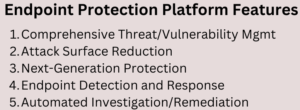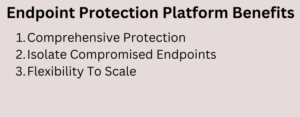
Network endpoint security is important for small businesses. The sophistication of cyber threats is increasing. As such, network security has become crucial for protecting business networks and data. Cybercriminals often target small businesses due to their perceived lack of adequate security measures.
We will provide a comprehensive guide to understanding endpoint security. We will discuss its importance relative to small business. Finally, we will discuss how small business can effectively implement network endpoint security to secure their networks.
Key Takeaways
- Endpoint security protects devices from cyber threats and unauthorized access.
- Small businesses need endpoint security due to high cyberattack risks.
- EPPs provide comprehensive threat management and advanced protection.
- Endpoint security is essential for secure remote work and BYOD policies.
- Cloud-based solutions offer scalable, robust endpoint protection.
Understanding Network Endpoint Security
Endpoint security is a type of cyber security solution that protects endpoints from cyber threats and unauthorized activity. Endpoints are devices such as laptops, smartphones, and Internet of Things (IoT) devices.
Endpoint security works against a variety of threats and unauthorized activities. It safeguards devices that connect to networks from cyberattacks. Effective endpoint security measures protect against malware, unauthorized access, and data theft. Consider deploying comprehensive endpoint security solutions, By doing so, businesses can prevent unauthorized access to sensitive data.
Endpoint security solutions employ features like endpoint detection and response to identify and respond to threats. Thus, endpoint protection can play a crucial role in preventing device infections.
How Endpoint Protection Works
Endpoint protection works by analyzing files before and after they execute. In this analysis, it looks for signs of suspicious activity or indicators of potential threats. Thus, it is a vital component of comprehensive protection for businesses of all sizes. Kinds of detections include malware, such as viruses or ransomware.
These threats can potentially cause data breaches. Endpoint security also looks for signs of unauthorized access. Unauthorized access can correspond to such events as unusual login patterns or attempts to modify system settings.
For instance, a file executes and attempts to connect to an unknown external network. The endpoint protection platform might then flag the file as suspicious. This platform can operate from the cloud for swift, scalable protection with minimal impact on user devices.
Thus, endpoint protection ensures robust network security, safeguarding all types of endpoints in enterprise networks.
The types of networks protected include those used in remote work or BYOD setups. A single agent from the cloud typically performs this analysis to allow for speed and scalability. The analysts occurs with little or any impact on end-user device performance.
In today’s digital landscape, endpoint security is essential. As the number of online threats grows, endpoint security provides a crucial line of defense. Thus safeguarding infrastructure from malicious actors.
Endpoint Security Solutions for Small Businesses
Endpoint security solutions have evolved from traditional antivirus software. Anti-virus software may miss new threats such as zero-day exploits and advanced persistent threats. Now they can provide a broad set of defenses against known and unknown threats. These threats include such things as malware, fileless attacks, exploits, and post-intrusion attack techniques.
Traditional antivirus solutions primarily focus on known threats and use signature-based detection.
Endpoint Protection Platforms

In contrast, modern endpoint protection platforms (EPP) offer:
- comprehensive threat and vulnerability management
- attack surface reduction
- next-generation protection
- endpoint detection and response
- automated investigation and remediation features.
Traditional antivirus solutions have been the go-to for many years. These solutions primarily focus on known threats. They tend to use signature-based detection to protect systems.
However, the cyber security landscape has evolved. Designers have crafted solutions to protect against new threats.
EPPs have emerged as a more comprehensive and effective approach. Thus, an EPP can secure systems against a wider range of threats.
Features of EPPs
Endpoint protection platforms offer a suite of features that go beyond the capabilities of traditional antivirus solutions. One of the key features of EPPs is comprehensive threat and vulnerability management. This involves identifying potential vulnerabilities in the system.
The EPP can effectively manage potential threats once identified to prevent exploitation by malicious actors. This proactive approach allows for the early detection and mitigation of threats. Thus, reducing the potential damage they can cause.
Another crucial feature of EPPs is attack surface reduction. This involves minimizing the number of potential entry points that an attacker can exploit. Thereby, it reduces the likelihood of a successful attack.
Various methods achieve this reduction in likelihood of attack. These methods include both system hardening and the implementation of least privilege policies.
Modern EPPs offer next-generation protection as another feature. This involves the use of advanced technologies to detect and respond to threats. These technologies include machine learning and artificial intelligence. These technologies enable EPPs to identify and mitigate threats that traditional antivirus solutions may miss.
Endpoint detection and response (EDR) is another key feature of EPPs. EDR solutions continuously monitor endpoints for suspicious activity, allowing for the rapid detection and response to potential threats.
Real-time monitoring and response capability significantly reduce the time it takes to detect and respond to threats. Thus. limiting their potential impact.
Finally, EPPs offer automated investigation and remediation features. When the EPP detects a threat, it automatically investigates the threat to understand its nature and potential impact. It can then take appropriate remediation actions, such as isolating affected endpoints or removing malicious software. This automation reduces the burden on IT teams and ensures a swift response to threats.
EPP Benefits

The benefits of using an endpoint protection platform for small businesses include:
- comprehensive protection against a wide range of threats
- the ability to isolate compromised endpoints to prevent attacks from spreading
- the flexibility to scale as the business grows
Comprehensive Protection with Network Endpoint Security
Endpoint security takes a comprehensive approach to network security, focusing on securing endpoints from exploitation by malicious actors. Network endpoint security is a critical component of business cyber security strategies. This is especially important in the face of an increasing number of sophisticated cyber threats.
Endpoint security solutions, such as EPP provide robust defenses against these threats. They continuously monitor the various endpoints that connect to the corporate network, identifying and responding to any potential threats.
These threats includes those associated with remote work and the Bring Your Own Device (BYOD) trend. These trends increase the number of endpoints. As a consequence, it increases the potential entry points for cyber threats.
Endpoint security solutions offer a more holistic view of network security than traditional antivirus solutions. They protect the entire business network not just the devices. This includes all of the endpoints connecting to it. This comprehensive protection is particularly important given the increasing number of devices that can connect to a network.
Threat Protection
Endpoint security solutions also offer advanced internal protection features. For example, they can use data encryption and data access controls to prevent unauthorized employees from accessing sensitive data. They can also use behavioral analysis to detect threats based on suspicious behavior from external and internal sources.
Endpoint security solutions protect against external threats. In addition, they can also help businesses manage the risks associated with remote work and BYOD policies. These policies can increase the number of endpoints and create new vulnerabilities for hackers to exploit.
Endpoint security solutions can help businesses secure these endpoints. Thus, ensure that employees can work safely, no matter where they are or what device they are using.
In conclusion, endpoint security provides comprehensive protection for businesses of all sizes. It helps prevent data breaches and protects against a wide array of cyber threats. It also enables businesses to manage the risks associated with an increasing number of endpoints.
Endpoint security plays a crucial role in today’s digital landscape. These solutions provide a level of protection that goes beyond what traditional antivirus solutions can offer,
The Role of Endpoint Security in Remote Work
The rise in remote and mobile workers has led to an increase in the number of endpoints. These are seen as endpoints. which are devices that connect to a corporate network. This expansion of the “protect surface” has moved beyond the confines of a corporate campus to endpoints scattered globally.
As a result, the need to secure all endpoints, including those owned by employees, has become more critical than ever. These devices, which store or access corporate data, must be safeguarded against potential cyberattacks.
Endpoint security plays a pivotal role in this context. It provides comprehensive protection for all devices that connect to the network. This is especially crucial in a remote work setup. Remote work causes the number of endpoints increases significantly. Thereby, raising the potential for security breaches.
Endpoint security solutions, such as Endpoint Protection Platforms (EPP), offer robust defenses against a wide range of cyber security threats. They help to prevent data breaches by securing the entry points into the network, which are often targeted by cybercriminals.
Remote Work and the Cloud
In the era of remote work, endpoint security has become an indispensable part of network security. It ensures that user devices are protected against threats. This is true whether they are part of a Bring Your Own Device (BYOD) policy or not.
Having a BYOD policy is particularly important for businesses of all sizes. The number of endpoints connecting to their networks can be vast and varied.
Cloud-based endpoint security solutions offer scalability and ease of management, making them suitable for protecting a large number of endpoints. They provide comprehensive protection. Thus, securing all types of endpoints that connect to the corporate network, from traditional user devices to IoT devices.
In conclusion, the role of endpoint security in remote work is to provide robust, comprehensive protection. This protection is for all devices connecting to the corporate network. This is achieved by securing the entry points into the network. Doing so prevents data breaches, and defending against a wide range of cyber security threats.
The BYOD (Bring Your Own Device) Trend and Endpoint Security
The Bring Your Own Device (BYOD) trend has become increasingly prevalent in today’s digital age. This involves employees using their personal devices for work purposes,.
The BYOD trend is especially prevalent in the context of remote work. These personal devices connect to the corporate network. They can potentially serve as entry points for cyber security threats.
Endpoint Protection Platforms (EPP) are instrumental in mitigating the risks associated with the BYOD trend. They provide comprehensive protection by monitoring and controlling the activities of various types of endpoints in enterprise networks. Thereby, ensuring network security. EPPs work by preventing data breaches and other cyber security threats, which are key concerns in the current digital landscape.
The successful implementation of a BYOD policy involves more than just the use of EPPs. It also requires educating users about safe and responsible practices. Employees need to understand the potential risks associated with connecting personal devices to the corporate network.
Users also need to know how to avoid behaviors that could compromise network security. This includes being cautious about the types of applications they download and the websites they visit on their devices. Also, they need to ensure that their devices are regularly updated with the latest security patches and updates.
In conclusion, the BYOD trend presents new challenges in terms of network security. This trend can be effectively managed through the use of Endpoint Protection Platforms. Also, working with users to promote safe and responsible behaviors.
Cloud-Based Endpoint Security Solutions
Cloud-based endpoint security solutions are designed to provide comprehensive protection for a variety of network endpoints. These solutions are particularly advantageous for businesses of all sizes. This is true because they cater to the growing trend of remote work and Bring Your Own Device (BYOD) policies.
Traditional antivirus solutions that focus on known threats. On the other hand, cloud-based endpoint security solutions offer a more holistic approach to network security. They detect and respond to known threats. Also, they identify and mitigate unknown threats using advanced technologies like machine learning and artificial intelligence.
These solutions secure entry points on user devices, providing a robust defense against cyber security threats, including data breaches. Endpoint Protection Platforms (EPP), which are typically cloud-based, offer seamless integration with enterprise networks. They allow for efficient management of a large number of endpoints, enhancing the overall security posture of the organization.
In the era of remote work, these solutions ensure that all user devices adhere to the organization’s security policies. This is true regardless of their location, This is crucial in preventing unauthorized access and protecting sensitive corporate data.
Securing Entry Points with Endpoint Security
Endpoint security solutions are pivotal in safeguarding entry points from cyber threats, blocking unauthorized access, and thwarting malicious activities. They isolate compromised endpoints, preventing the spread of attacks across the network.
With the rise in remote and mobile workers, the number of exposed endpoints has surged. Thus, necessitating robust endpoint security measures for all devices. This includes those devices owned by employees.
Endpoint security solutions offer comprehensive protection by integrating multiple security engines to halt every stage of an attack. They provide broad visibility for expedited investigation and response, enabling swift threat elimination and recovery from attacks. Cloud-based management and deployment streamline operations and rapidly scale to accommodate more users and data.
Endpoint security solutions, with a single lightweight agent, offer both prevention and detection/response to endpoint threats. In essence, securing entry points with endpoint security solutions is a critical aspect of network security. Thus, ensuring comprehensive protection against cyber threats.
Conclusion
Network endpoint security has transitioned from an optional feature to an essential requirement. This is especially true for small businesses. This exploration of endpoint security provided a thorough understanding of its definition and an examination of the diverse solutions available.
We’ve emphasized the significance of securing all devices that connect to your corporate network. We’ve also highlighted the role of endpoint security in the context of remote work. Also, we have highlighted the growing trend of Bring Your Own Device (BYOD). We have also discussed the advantages of cloud-based solutions.
Given the ever-evolving nature of cyber threats, it’s imperative for businesses to invest in comprehensive endpoint security solutions. This investment is crucial not only for protecting business data but also for maintaining trust with clients.
Questions? We Have Answers.
Get answers to a list of the most Frequently Asked Questions.

Experienced cybersecurity analyst, software engineer, patent attorney, worked with Linux, Windows, AWS, lots of security tools. Hope to help people do the right things and do the things right!


